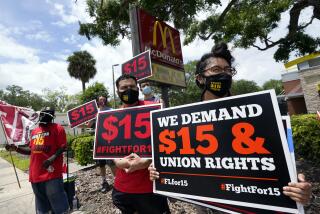Small Businesses Gain New Clout in Washington
- Share via
WASHINGTON — A year ago, when San Antonio truck parts dealer Mike Manuppelli went calling on Congress, the best he could manage was some meetings with a couple of legislative aides who only half-listened to what he said.
But when he returned to Washington a few days ago, he got the personal attention of two Texas senators and three representatives.
Manuppelli is still the same fellow who owns Automotive Truck Parts Co. in San Antonio and belongs to Texas Small Business United, a grass-roots lobbying group.
What’s different is that small business has learned how to flex its political muscle, and Congress has gotten the message. In fact, the red carpet has been out all this week for small-business owners and their families being honored during the Small Business Administration’s Small Business Week.
Business owners from 50 states, the District of Columbia, Guam and Puerto Rico descended on the city for a frenzy of awards ceremonies, speeches and events.
“There is a tremendous difference just in a 12-month period,” said Manuppelli. “The people we visited with this time were not only much more receptive, but they really wanted to know the pulse of the small-business owners.”
And, on Monday, while scores of small-business owners swarmed in and out of offices on Capitol Hill, President Bush’s chief of staff, John H. Sununu, personally assured representatives of several business groups that the President would veto any bill requiring businesses to provide unpaid maternity or family leaves.
Virtually every small-business organization has been loudly opposing mandated leave, so Bush’s promise was the latest victory for their lobbying efforts.
The leaders of the congressional small business committees say the winds have shifted in favor of the little guy since last fall’s repeal of Section 89, a tax law that outraged the small-business community.
For more than a year, business owners protested against Section 89, a regulation riddled with eye-crossing formulas that would have required business owners to provide the same kinds of benefits to entry level employees as they provided executives.
“I think small-business organizations feel prouder of themselves now and are aware that they have more clout,” said Rep. John J. LaFalce (D-N.Y.), who serves as chairman of the Committee on Small Business. “I do think there is strength in numbers.”
In recent months, small-business groups have rallied to oppose mandated health care, portions of the Americans with Disabilities Act and an inheritance tax law that imposes a burden on family-owned firms trying to pass the company along to the next generation.
Legislators and Bush are seeking out small-business support for their favorite issues by being more accessible, according to veteran small-business advocates.
“I’ve seen an incredible recognition of small business on the Hill,” said Christine Russell, chief House lobbyist for the U.S. Chamber of Commerce. Russell, who until recently served as director of the chamber’s Small Business Center, said legislators are listening more closely to small-business owners because their companies are the ones creating most of America’s new jobs.
“It’s satisfying to have people calling us rather than us going to camp out on their doorsteps,” said John Satagaj, president of the Small Business Legislative Council, which represents 103 trade associations.
Mel Boldt, chairman and chief executive of BMI Inc., a Palatine, Ill., maker of clips and clamps, said he has been lobbying in Washington since 1980.
“In 1980, it was ‘what is small business and why is it different from big business?’ ” said Boldt, who attended a recent joint meeting of National Small Business United and the National Assn. of Women Business Owners in Washington. “Now they realize there is a position between the unions and big business.”
Art Sweet, president of Certified Business Funding, a North Hollywood small-business lender, agreed that legislators are taking what he has to say more seriously than in the past.
“They really want to find out what’s right for small business,” said Sweet. “I do feel we are getting our message across.”
The small-business owners also feel a strong comradeship with Bush.
Karl Krieger, president of the 50,000 member National Small Business United, called Bush “a small-business President” who is “right with us on 90% of the issues.”
Bush, who owned his own small oil drilling company in Texas feels, a kinship with the small-business community, according to Jeff Vogt, a business liaison for the White House. Bush also hopes his small-business friends will get behind his move to reduce the capital gains tax and reduce the budget deficit without raising taxes.
“The President feels they will roll up their sleeves and get to work for him on Capitol Hill,” said Vogt.
After the visiting small-business owners have returned home, representatives of the National Federation of Independent Business, which has 500,000 members, and National Small Business United, will remain behind to look out for their members’ interests.
“Small-business owners can do for politics in the 1990s what labor unions did in the 1950s,” said John Sloan, president of the National Federation of Independent Business. “I think we are just gaining momentum, and there are still very exciting times ahead of us in what we can accomplish.”
John Galles, executive vice president of National Small Business United, said the 1990s are going to be very tough on small business because of uncertainty about the economy and the threat interference by government in business affairs. “Small-business owners need to do battle to protect their interests,” he said.
Back in California, the California Chamber of Commerce is forming a coalition of small-business groups to strengthen any positions taken, according to Maxine Weinman, the politically active owner of Maxine’s Seafood Cafe in Hollywood.
“In California, there still needs to be more unification between the small-business groups,” said Weinman, who serves as legislative chair for the Los Angeles chapter of the National Assn. of Women Business Owners.
But, Weinman said small business’ political clout does not yet match its economic clout in the state.
“Almost every week I get a letter from a legislator asking for input on issues affecting small business,” said Devon Blaine, president of the California chapter of National Small Business United.
More to Read
Inside the business of entertainment
The Wide Shot brings you news, analysis and insights on everything from streaming wars to production — and what it all means for the future.
You may occasionally receive promotional content from the Los Angeles Times.










